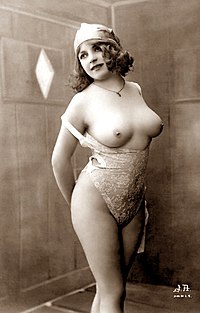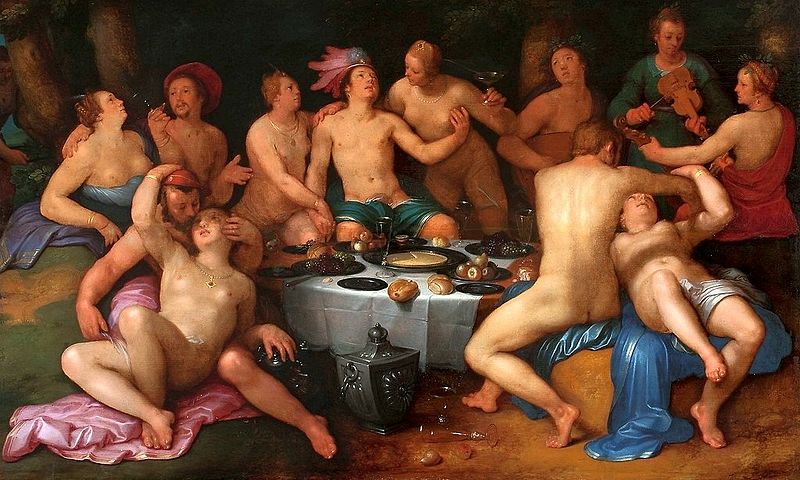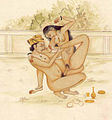Portal:Erotica and pornography
Introduction

Pornography (colloquially known as porn or porno) has been defined as sexual subject material "such as a picture, video, or text" that is intended for sexual arousal. Made for the consumption by adults, pornography depictions have evolved from cave paintings, some forty millennia ago, to virtual reality presentations. A general distinction of adult content is made classifying it as pornography or erotica.
The oldest artifacts considered pornographic were discovered in Germany in 2008 CE and are dated to be at least 35,000 years old. Throughout the history of erotic depictions, various people made attempts to suppress them under obscenity laws, censor, or make them illegal. Such grounds and even the definition of pornography have differed in various historical, cultural, and national contexts. The Indian Sanskrit text Kama Sutra (3rd century CE) contained prose, poetry, and illustrations regarding sexual behavior, and the book was celebrated; while the British English text Fanny Hill (1748), considered "the first original English prose pornography," has been one of the most prosecuted and banned books. In the late 19th century, a film by Thomas Edison that depicted a kiss was denounced as obscene in the United States, whereas Eugène Pirou's 1896 film Bedtime for the Bride was received very favorably in France. Starting from the mid-twentieth century on, societal attitudes towards sexuality became more lenient in the Western world where legal definitions of obscenity were made limited. In 1969, Blue Movie became the first film to depict unsimulated sex that received a wide theatrical release in the United States. This was followed by the "Golden Age of Porn" (1969–1984). The introduction of home video and the World Wide Web in the late 20th century led to global growth in the pornography business. Beginning in the 21st century, greater access to the Internet and affordable smartphones made pornography more mainstream. (Full article...)
Erotica is literature or art that deals substantively with subject matter that is erotic, sexually stimulating or sexually arousing. Some critics regard pornography as a type of erotica, but many consider it to be different. Erotic art may use any artistic form to depict erotic content, including painting, sculpture, drama, film or music. Erotic literature and erotic photography have become genres in their own right. Erotica also exists in a number of subgenres including gay, lesbian, women's, bondage, monster and tentacle erotica.
The term erotica is derived from the feminine form of the ancient Greek adjective: ἐρωτικός (erōtikós), from ἔρως (érōs)—words used to indicate lust, and sexual love. (Full article...)
Selected article
Bettie Mae Page (April 22, 1923 – December 11, 2008) was an American model who gained notoriety in the 1950s for her pin-up photos. She was often referred to as the "Queen of Pinups": her long jet-black hair, blue eyes, and trademark bangs have influenced artists for generations. After her death, Playboy founder Hugh Hefner called her "a remarkable lady, an iconic figure in pop culture who influenced sexuality, taste in fashion, someone who had a tremendous impact on our society".
A native of Kingsport, Tennessee, Page lived in California in her early adult years before moving to New York City to pursue work as an actress. There, she found work as a pin-up model, and she posed for several photographers throughout the 1950s. Page was "Miss January 1955", one of the earliest Playmates of the Month for Playboy magazine. After years in obscurity, she experienced a resurgence of popularity in the 1980s.
In 1959, Page converted to evangelical Christianity and worked for Billy Graham, studying at Bible colleges in Los Angeles and Portland, Oregon, with the intent of becoming a missionary. The latter part of Page's life was marked by depression, violent mood swings, and several years in a state psychiatric hospital with paranoid schizophrenia. (Full article...)Selected work of erotic literature
Slideshow of selected contemporary images
Slideshow of selected historical images
Did you know (auto-generated) -

- ... that the 1980s were the "age of hole-discovery" in yaoi erotica?
- ... that Christian radio station KIXL near Austin, Texas, pulled an anti-pornography program off-air in mid-transmission because of its graphic descriptions of gay sex?
- ... that Aroha Bridge changed its name from Hook Ups because fans searching for the show often found pornography instead?
- ... that a pornographic screenplay about Jesus led to papal and royal condemnations, a firebombing, the writer's ban from the UK, and thousands of letters per week demanding the ban of a non-existent gay Jesus film?
- ... that a pornographic video service once offered NFL quarterback Gardner Minshew a one-million-dollar endorsement deal based on his habit of exercising in nothing but a jockstrap?
- ... that Koh Masaki was one of the first gay pornographic film actors in Japan to openly appear in adult films without obscuring his identity?
- ... that according to one source, The Embroidered Couch is "most likely China's earliest vernacular pornographic novel"?
- ... that the 1983 pink film Beautiful Mystery was one of the earliest commercially produced gay pornographic films in Japan?
Topics
Categories
Related portals
Associated WikiProjects
 |
 |
| Sexology and sexuality | Pornography |
Associated Wikimedia
The following Wikimedia Foundation sister projects provide more on this subject:
-
Commons
Free media repository -
Wikibooks
Free textbooks and manuals -
Wikidata
Free knowledge base -
Wikinews
Free-content news -
Wikiquote
Collection of quotations -
Wikisource
Free-content library -
Wikiversity
Free learning tools -
Wiktionary
Dictionary and thesaurus




































































![Image 16Indian Princess, by Richard Borrmeister [de] (1888?)](http://upload.wikimedia.org/wikipedia/commons/thumb/0/01/Richard_Borrmeister_Indische_Prinzessin_1888.jpg/102px-Richard_Borrmeister_Indische_Prinzessin_1888.jpg)




































